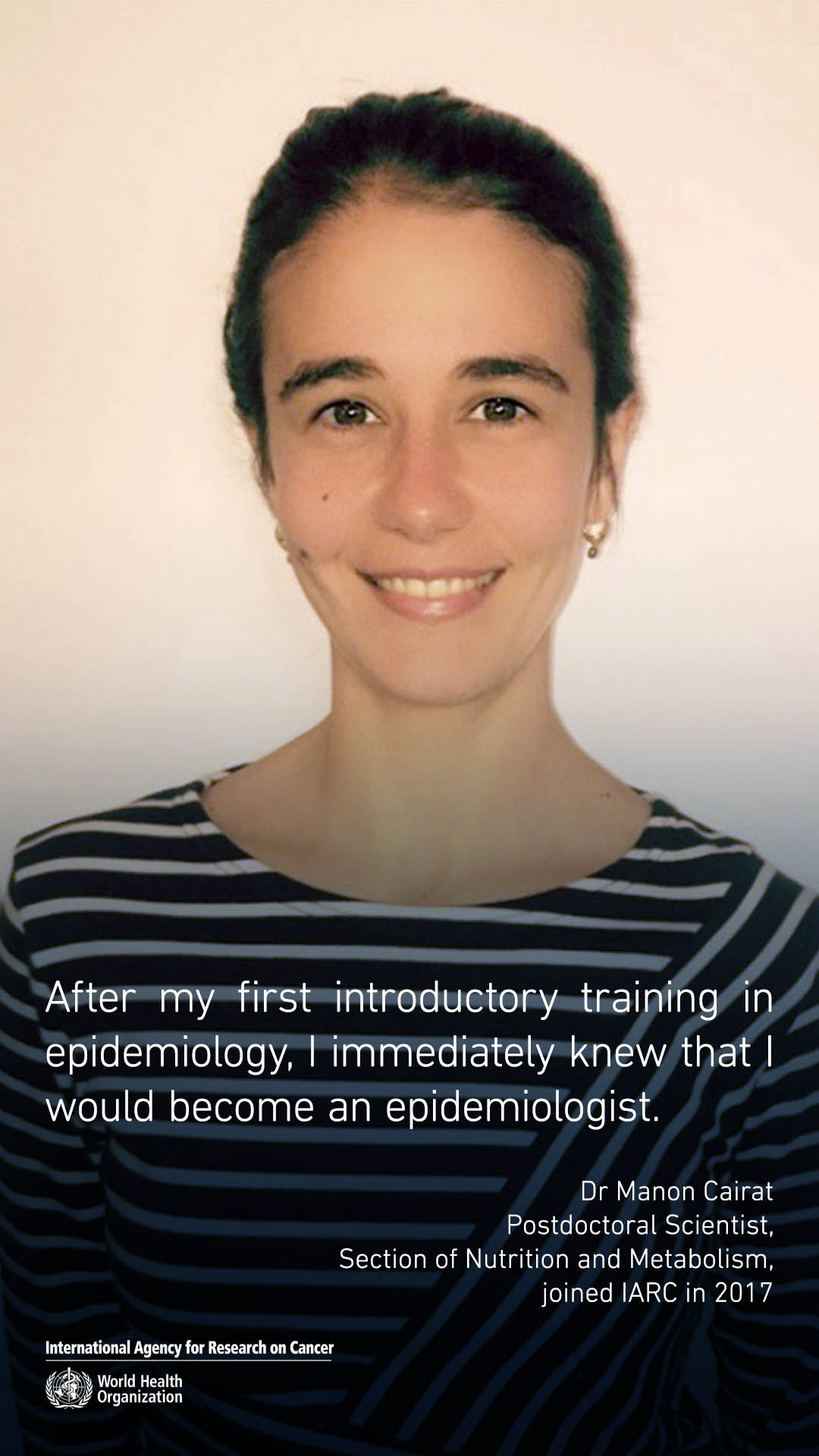Portraits of Scientists Home
❝After my first introductory training in epidemiology, I immediately knew that I would become an epidemiologist.❞
Please introduce yourself. How long have you worked at IARC?
My name is Manon Cairat. I arrived at IARC in early 2017, in the Section of Nutrition and Metabolism, as a master’s student. Later, in November 2017, I won a competitive grant from La Ligue contre le Cancer, the French League Against Cancer, to start a PhD under the supervision of Dr Laure Dossus. Having recently completed my PhD in epidemiology, I am now a postdoctoral scientist.
What are the most interesting projects you are currently involved in, and why are they important?
I am going to start a 20-month position as a postdoctoral scientist at the Institut national de la santé et de la recherche médicale (Inserm), under the supervision of Dr Agnès Fournier. I am thrilled to start this new project, which aims to (i) quantify the presence of excipients in drugs available on the French market, (ii) estimate the French population exposure to these excipients through drug consumption, and (iii) investigate the potential relationship between titanium dioxide exposure from drugs and cancer risk. This project will be conducted in the Etude Epidémiologique auprès de femmes de la MGEN (E3N) cohort and the Système National des Données de Santé (SNDS), the French nationwide health-care database.
What do you do when you’re not doing research at IARC?
Because I cycled 17 km every morning and evening to commute to work, my colleagues know that I am a cyclist. Cycling is not only my favourite means of transport but also one of my top leisure activities. I really enjoy discovering new places by biking, or challenging myself by going up famous French mountain passes, such as Mont Ventoux or Alpe d’Huez. I also like running and walking, especially with my dogs. In summer, you might see me on the lakes, wakeboarding or paddling. I also like to try new physical activities, most recently diving, kitesurfing, and rowing!
Why did you move into research?
Everything started while I was completing my bachelor’s degree in health engineering at the Faculty of Pharmacy at the University of Montpellier. During my studies there, I had the opportunity to do two internships, the first in clinical research and the second in the Centre of Pharmacovigilance of Montpellier. Discovering the various side-effects of drugs, their fate in the environment, and the importance of their appropriate use awakened my interest in working towards protecting and improving the population’s health and welfare.
After my first introductory training in epidemiology, I immediately knew that I would become an epidemiologist. However, whether I would work on environmental factors, nutrition, or drugs was still undecided. Then, I completed two Master of Public Health degrees: one related to environmental risks and the other on human nutrition. Before coming to IARC, I performed my first epidemiological study, supervised by Dr Isabelle Momas and Dr Fanny Rancière, on the occurrence of respiratory disorders and allergies in children after they had been in a swimming pool, within the Paris prospective birth cohort study.
Which personal scientific contribution are you most proud of?
I am very proud of my PhD projects, which intended to improve our understanding of the etiology of breast cancer by (i) identifying potential inflammatory biomarkers related to breast cancer development and (ii) investigating the potential effects of aspirin and anti-inflammatory drugs in preventing breast cancer. Both projects were conducted within the European Prospective Investigation into Cancer and Nutrition (EPIC) cohort, and its French component, the E3N cohort.
What is something you do now because of research you’ve read?
Before coming to IARC as a master’s student, I had never spoken much English and it was very challenging for me. To be honest, I attended some presentations, smiling, without understanding what was being said! One tip that I had read, in the hope of being able to understand better, was to listen to English daily, so I bought all the Harry Potter books as audiobooks! It really helped me, and it has become part of my daily routine to listen to audiobooks in English.
